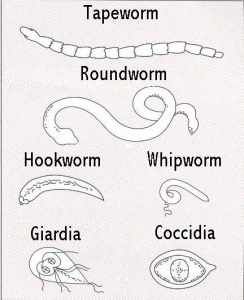-
Adopt
-
Veterinary Care
Services
Client Information
- What to Expect – Angell Boston
- Client Rights and Responsibilities
- Payments / Financial Assistance
- Pharmacy
- Client Policies
- Our Doctors
- Grief Support / Counseling
- Directions and Parking
- Helpful “How-to” Pet Care
Online Payments
Emergency: Boston
Emergency: Waltham
Poison Control Hotline
-
Programs & Resources
- Careers
-
Donate Now
 by Lisa Maciorakowski, DVM
by Lisa Maciorakowski, DVM
617-524-5653
angell.org/generalmedicine
generalmedicine@angell.org
Intestinal parasites are extremely common in both cats and dogs. Several types of internal parasites (frequently referred to as worms) can infect animals of any age, although puppies and kittens tend to be the biggest victims. While many animals can be asymptomatic carriers of these parasites, others can become very sick. The most common types of parasites are roundworms, tapeworms, hookworms, whipworms, coccidia and giardia. Some of these parasites can occasionally infect humans as well. In order to prevent spread of these parasites, routine fecal testing, a preventative deworming schedule, and good sanitation/environmental control are essential.
Sometimes dogs and cats will have no obvious outward signs that they are carrying parasites. Adult worms are not always seen in the feces. Sometimes the parasite eggs or larvae lie dormant in the intestinal tract until they become activated under times of stress. However, the most common symptom of having intestinal parasites is diarrhea, sometimes with blood in it. If the parasite burden is large, they can also cause vomiting, obstruction, decreased appetite, lethargy, weight loss/underweight body condition, or a poor general appearance. Animals that have excessive vomiting and diarrhea can become dehydrated and require intensive care.
Of the most common parasites, roundworms and tapeworms are the two that are most likely to be seen in the stool. Roundworms have a spaghetti-like appearance. Tapeworms segments look like grains of rice and can be seen either on the feces or crawling around on the hind end of the animal. Hookworms and whipworms, both more common in dogs than in cats, are very small and often not seen in the feces. Both giardia and coccidia are microscopic parasites that cannot be seen by looking at the stool with the naked eye.
Most of the parasites are spread by the animal’s ingestion of feces either directly or indirectly. Some are passed to the puppy or kitten through their mother’s placenta or milk. Giardia can also be contracted from drinking contaminated water. Certain parasites can occasionally migrate to other areas of the animal’s body where they can cause harm.
While most of the parasites are species-specific, it is sometimes possible for humans to become infected as well. This is most often the case with children who play in contaminated areas and individuals with compromised immune systems. The most common human problems associated with intestinal parasites of animals are cutaneous and visceral larval migrans. These problems occur when parasite larva (hookworms) penetrate human skin or when parasite eggs (roundworms) are accidentally consumed and migrate to various organs. If they enter the eye (ocular larva migrans) they may damage the retina and cause blindness. Giardia is a common cause of diarrhea in humans independent of pet contamination. While pet-related giardia is generally species-specific, there is concern about potential cross-human contamination and precaution should be taken when handling dogs infected with this parasite.
Early diagnosis for the presence and type of intestinal parasite is vital. Since many animals do not show any signs of having intestinal parasites and adult worms are not always present in the feces, it is important to have a stool sample checked routinely by a veterinarian. This test should be done at least a couple of times for puppies and kittens during their first year and then at least yearly thereafter for adults. This is often done as part of a routine annual health examination. It is important to note that since tapeworm eggs do not show up well in routine fecal analyses, your veterinarian should be notified if you see any of those rice-like segments near your pets’ tail. A stool sample should also be checked for parasites anytime an animal has any of the possibly related symptoms.
To prevent environmental contamination, it is recommended that all puppies and kittens be routinely treated, or dewormed, with a standard deworming solution at 2, 4, 6 and 8 weeks of age and then placed on a monthly heartworm preventative that includes protection against several of the intestinal parasites. The animal may also be treated with an additional dewormer depending on the type of worm present. Not all worms respond to the same treatment and no single dewormer works against all kinds of parasites and a fecal sample should be rechecked following the completion of the treatment. Additionally, some non-prescription dewormers are not very effective in removing worms. Your veterinarian will have the best kind of dewormer available for the particular type of parasite in your pet.
To prevent re-infection it is important to scoop the litter box and clean up the yard after each and every bowel movement. Since tapeworms are often spread from fleas, topical year-round flea preventative is also recommended. Sometimes a disinfectant wash is recommended for use on the dog’s hind end after each defecation. Especially important is that owners remember their own good hygiene and wash hands after handling their animals.
So even though these intestinal parasites are very common and can sometimes cause no obvious symptoms, the importance of good parasite prevention cannot be stressed enough. Left untreated we would have many more sick animals and increase the risk of spread to humans as well. All these reasons support the importance of those annual fecal tests even in your seemingly healthy pet.
For information about Angell’s General Medicine service, please visit here or call 617-524-5653.
